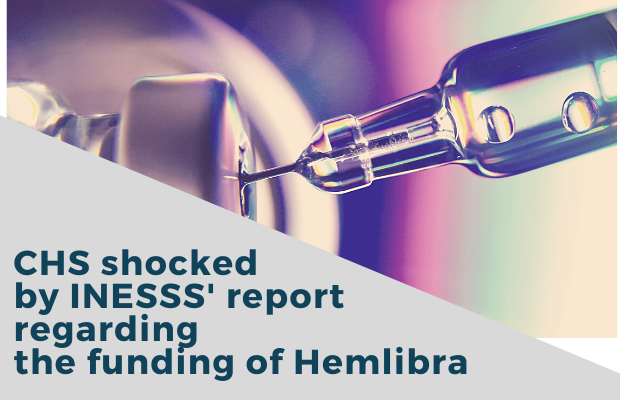CHS replies to Quebec’s INESSS following its shocking report on the funding of Hemlibra

The Institut national d’excellence en santé et en services sociaux (INESSS) released its recommendation on funding Hemlibra (emicizumab) for the treatment of severe hemophilia A (without inhibitors) on March 16. It recommended to the ministère de la Santé et des Services sociaux (MSSS) that Hemlibra “not be included in the list of products for Quebec’s blood system.”
“We are shocked and dismayed,” said Paul Wilton, president of the Canadian Hemophilia Society (CHS), headquartered in Montreal. “We have talked to hundreds of people around the world whose lives have been transformed by this new therapy. Reading this report, one has to question the competence and objectivity of INESSS. Their conclusions contradict the scientific evidence presented in their own report. The perspective of patients is entirely misrepresented. The efficacy of current treatments is exaggerated.”
We cannot understand how such a report could be produced. Does INESSS not master the research methodologies used to evaluate a drug for a rare disease such as hemophilia where the number of patients enrolled in research studies is small? Were international experts and health technology assessments not consulted? Did fears about potentially higher costs (prices are not known at this stage) lead INESSS to reject Hemlibra on unfounded issues of efficacy and safety?
Endorsement of this recommendation by the MSSS would leave Quebec standing as an anomaly, alone among developed countries in not making this treatment advance accessible. For example:
- Hemlibra is considered safe and effective by the world’s major regulatory bodies for the treatment of hemophilia A (Health Canada, U.S. FDA, European Medicines Agency …);
- Hemlibra is recommended as a preventative treatment for severe hemophilia A in the World Federation of Hemophilia (WFH) Guidelines for the Management of Hemophilia, 3rd edition, released in 2020;
- Hemlibra is already funded for the routine prevention of bleeding in severe hemophilia A (with and without inhibitors) by almost all developed countries (U.S., Japan, Australia, United Kingdom, Ireland, France, Germany and many others);
- Hemlibra is distributed to more than 20 countries in the developing world through the WFH’s Humanitarian Aid Programme;
- INESSS’ counterpart in the rest of Canada, the Canadian Agency for Drugs and Technologies in Health (CADTH), recommended on December 21, 2020, that Hemlibra be funded for the treatment of patients with hemophilia A (subject to pricing conditions). A decision by the Provinces and Territories (except Quebec) is imminent.
The Association of Hemophilia Clinic Directors of Canada (AHCDC), representing the 70 expert physicians who treat hemophilia across Canada, including 11 in Quebec, has stated, “We are well aware of the benefits Hemlibra has brought to patients in other advanced countries, where it has become the treatment of choice for many severely affected hemophilia A patients. Failure to list Hemlibra would be unacceptable to members of the AHCDC.”
Research data and real-world evidence have proven that Hemlibra …
- reduces the frequency of internal bleeding by maintaining a steady-state hemostatic level, as compared to the peaks and low troughs of current therapies;
- has an excellent safety profile in more than 7,000 patients worldwide;
- increases quality of life by removing the need for multiple intravenous infusions weekly;
- removes the need for central venous access devices, with their risks of infection and thrombosis, in young children;
- allows children and their caregivers as well as adults with hemophilia to more fully contribute to society;
- lowers non-drug health costs such as hospital visits and surgeries, and reduces the personal, social and economic burden for families.
In 2019, Hemlibra was introduced across Canada, including Quebec, for the treatment of a sub-group of 80 patients with hemophilia A with inhibitors, a complication of hemophilia in which the body’s own immune system destroys the factor VIII protein when infused. Hemlibra proved to be life-changing, reducing bleeding and hospitalizations, and greatly improving quality of life. Moreover, the change resulted in tens of millions of dollars per year in savings in drug costs for the health system.
“The CHS and its Quebec Chapter are appealing to Minister Dubé,” said Paul Wilton. “We are asking him to recognize that the conclusions of the INESSS report are contrary to evidence and best practices from around the world. The report is flawed and should be set aside. We are requesting that the MSSS immediately add Hemlibra to the list of products for Quebec’s blood system. Quebeckers with severe hemophilia A deserve no less. Quebec used to be among the world leaders in hemophilia care; now patients receive a lower standard of care than those in some developing countries.”
Go to www.hemophilia.ca/hemlibra-access to know everything there is to know about the issue and to see how you can add your voice to ours to make a real difference.




